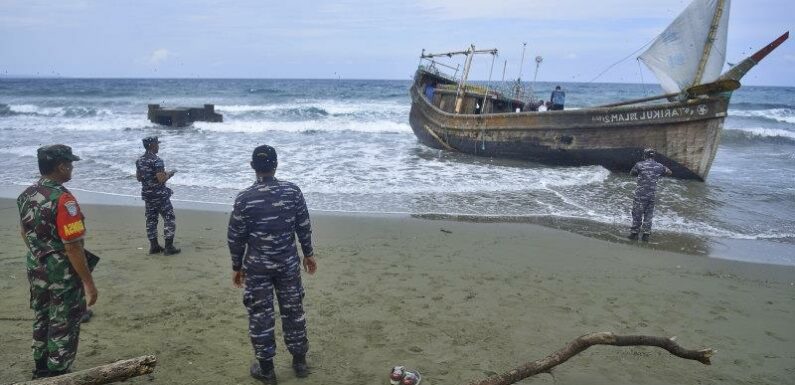
The United Nations refugee agency has praised Indonesia’s decision to rescue hundreds of Rohingya refugees who were abandoned by neighbouring countries as an “act in support of humanity.”
The Geneva-based UNHCR said Indonesia had helped save 472 people in the past six weeks, with 200 saved over the Christmas period alone.
Indonesian soldiers help Rohingya women and children at a temporary shelter after their boat landed in Pidie, Aceh province on Boxing Day.Credit:AP
On Sunday, residents of the fishing village of Ladong in Aceh province helped 58 refugees who arrived on a wooden boat that landed at Indrapatra beach. The refugees had been destined for Malaysia.
On Boxing Day, authorities and fishermen helped 174 additional people – including women and children – on a second boat to come ashore.
Babar Baloch, the UNHCR’s regional spokesman in Bangkok, said that the boat had set out from Bangladesh a month ago and was originally carrying 200 passengers, but many had died after the boat’s engine failed and governments in the region refused to rescue them.
“Twenty-six people could not survive the dire conditions on the boat,” Baloch told The Sydney Morning Herald and The Age.
He said the UNHCR had asked multiple governments to help, but that their pleas were refused.
“We were raising alarm about this boat in early December because we had information that it was in the regional waters at least at the end of November,” he said.
“So when we first got reports that it was somewhere near the coast of Thailand, we approached authorities asking them to help, then when it was moving towards Indonesia and Malaysia we did the same.
A Rohingya man has his photo taken as he is registered at a temporary shelter in Pidie in the Indonesian province of Aceh.Credit:AP
“After its engine failure and it was drifting in the sea, there were reports of this boat being spotted close to Indian waters and we approached and asked them as well and we were also in touch with authorities in Sri Lanka.”
Sri Lanka came to the aid of another boat, while Indonesia saved more than 200 lives in two days.
“Indonesia also stepped forward in mid-November to save people from two other boats as well,” Baloch said.
“So currently as we speak, the only countries in the region that have acted are Indonesia, in big numbers and Sri Lanka as well.
“It is an act in support of humanity – there’s no other way to describe it.”
Lilianne Fan, chair of the Rohingya Working Group of the Asia Pacific Refugee Rights Network, said sea crossings were on the rise.
“Rohingya have been embarking on dangerous journeys for years to escape systematic persecution in Myanmar, and now we are also seeing many fleeing from the refugee camps in Bangladesh where conditions are deteriorating,” Fan said.
“This year, however, we are seeing higher numbers, and more entire families with men, women and children fleeing together, driven by renewed conflict in Rakhine State and rising insecurity in the camps in Cox’s Bazar.”
Indonesia, a Muslim democracy, is not party to the international refugee convention. This means the roughly 14,000 refugees already in the country have limited rights, including no working rights.
Australia, which is a signatory to the convention, has stemmed the flow of refugees to its shores by turning boats back at sea, including to Indonesia.
The UK is trying to emulate Australia’s success in denying resettlement to refugees who travel by boat. The British government has struck a deportation deal to send potential asylum seekers who cross the English Channel to Rwanda for resettlement.
Both countries argue that stopping people smugglers from selling dangerous boat journeys saves lives.
Baloch agreed the wooden boats were “death traps” and that people smugglers did not care about the lives of their clients, but said sharing responsibility was the only way to tackle the problem in the Asian region.
“Countries and states in the region have international obligations to help desperate people,” he said.
“We have been calling on states to go after people smugglers and human traffickers as they are responsible for putting people on those death-trap boats, but victims have to be saved and saving the human life is the most important act.
“The refugee issue and saving lives cannot just be left to one country, it has to be done collectively, together in the region.”
In 2018, more than 730,000 Rohingya Muslims fled to neighbouring Bangladesh following a military crackdown in Buddhist-majority Myanmar that included mass killings and rape.
Nearly 1 million people live in crowded conditions in camps in Bangladesh and at least 2000 – almost quadruple the number that departed last year – are believed to have left on boats this year destined for neighbouring Muslim-majority countries.
Tun Khin, a Rohingya activist who fled his country and presides over the Burmese Rohingya Organisation UK, said countries should be following Aceh’s example, rather than Australia’s.
“These people are facing genocide in Burma,” Khin said. “It is a hopeless situation for them in Bangladesh, there is no dignity of life there.
“Australia has too often set a shameful example for the region through its treatment of refugees.”
Get a note direct from our foreign correspondents on what’s making headlines around the world. Sign up for the weekly What in the World newsletter here.
Most Viewed in World
From our partners
Source: Read Full Article

